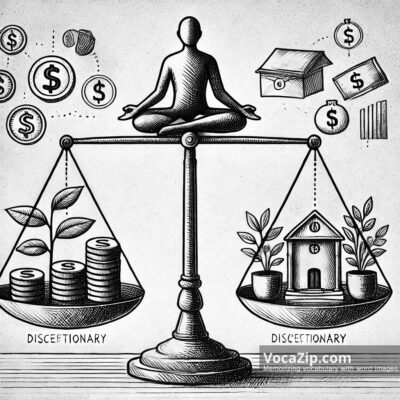discretionary meaning
discretionary :
optional, voluntary
adjective
▪ The company allocated discretionary funds for employee bonuses.
▪ The company set aside optional money for employee bonuses.
▪ Employees have discretionary time to work on personal projects.
▪ Employees have voluntary time to work on personal projects.
paraphrasing
▪ optional – voluntary
▪ voluntary – optional
▪ flexible – adaptable
▪ elective – chosen

Pronunciation
discretionary [dɪˈskrɛʃ.əˌnɛri]
The stress is on the third syllable 'shə', and it sounds like 'di-skre-shə-ner-ee'.
Common phrases and grammar about discretionary
discretionary - Common meaning
adjective
optional, voluntary
Part of Speech Changes for "discretionary"
▪ discretion (noun) – the ability to decide what should be done in a particular situation
▪ discretionaryly (adverb) – in a manner based on personal judgment
Common Expressions with "discretionary"
▪ discretionary budget – a budget based on personal choice
▪ discretionary spending – spending based on personal preference
▪ discretionary income – income left after necessities have been paid
▪ discretionary authority – power to make decisions
Important examples of discretionary in TOEIC
Vocabulary examples from the TOEIC test
In TOEIC vocabulary questions, discretionary is often used to describe budgets or funds that can be used at one's choice.
Example of a confusing word: mandatory (required)
Grammar examples from the TOEIC test
As an adjective, discretionary often describes something that is optional and left to personal judgment in grammar questions.
discretionary
Idioms and fixed expressions in TOEIC
discretionary funds
'optional money', used for non-essential expenses in business contexts.
at one's discretionary discretion
means 'based on personal judgment' frequently used in formal contexts.
Differences between similar words and discretionary
discretionary
,
optional
differences
discretionary means based on personal choice, while optional means something that can be chosen but not necessarily based on judgment.
discretionary
,
voluntary
differences
discretionary involves personal judgment in choosing, while voluntary simply means something is done by choice without implication of judgment.
Words with the same origin as discretionary
The origin of discretionary
the word 'discretionary' comes from the noun 'discretion', which means the freedom to decide what should be done in a particular situation.
Word structure
It has the root 'discretion' and the suffix 'ary', so discretionary means 'related to discretion'.
Words with the same origin
The root of discretionary is discretion. Words with the same root include discretion (freedom to decide), indiscretion (lack of discretion), discreet (careful and prudent), and discretionaryly (in a discretionary manner).
Please select an image in the quiz
Previous post and next post


discretionary
699
optional, voluntary
adjective ┃
Views 2






